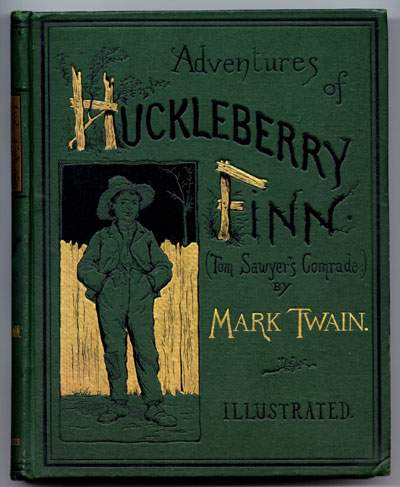 Love or hate e-books, so many people at least have an opinion on the topic.
Love or hate e-books, so many people at least have an opinion on the topic.
Rich Adin at the blog An American Editor writes, “Are eBooks the Death Knell of Authorial Greatness?” Adin is an e-book reader, but he seems worried that authors may never be considered great again because of the physical absence of books.
“Part of the problem, I think, is that recalling my library books involves a visual scan of its shelves, something that is easy to do with shelves of hardcover books staring at me and difficult to do with e-books because that casual eyescan is not as readily accomplished. This visual scanning acts as a stimulus to my memory because it thrusts the title to the front of my mind, which triggers the content recall,” Adin writes.
I used to have a huge bookshelf that ran from floor to ceiling—eight shelves stuffed with books. The quickest thing to make you want to stop reading books is moving. In about five years, I moved about six times. The physical book collection became smaller, but I never stopped reading.
I enjoyed reading more and more on my Nook and then my Nexus 7, and my collection grew larger. Moving became much easier.
I still gaze at my e-books from time to time, using Goodreads as a way to track them. The cover art is on the site along with small reviews I’ve written, which actually helps me remember the book—months, or even years after reading it.
In the e-book age, we haven’t had time to create great authors. Adin points to Dickens, Twain, Steinbeck and Hemingway:
“I think part of their lasting greatness is a result of their books being always in front of us. I grant that the bulk of their greatness lies in their writing, but even great tomes can fall into obscurity when they are absent from the eyes of readers. Part of the reason I think this is truth is that I have tried, unsuccessfully, to identify any ebook-only author of the past decade who is viewed similarly to Hemingway or Steinbeck.”
One of my issues with Adin’s post is his efforts to relate modern authors to those who have had decades to be considered by historians, literary pundits and readers who devoured their writing.
How many authors in the last 10 years—whether they have published e-books or not—have been compared to the major authors? Not many.
I don’t think physical books will decide the next great author. Just time.
































Musicians don’t seem worried that a lack of vinyl albums or CDs on people’s shelves won’t make them great. I don’t think print books will go away anytime soon, but in the very long run, digital will become the norm.
I don’t think that lack of physical books will be the downfall of authorial greatness, but the cultural focus away from writing. Nobody asks what the “great” writers think any more. They ask pop stars, movie stars, and music stars. And from shallow sources you’ll great shallow answers.
Could authors like Salmon Rushdie, Philip Roth, and Margaret Atwood hold up to Steinbeck and Hemingway? Maybe. But if writing can’t be “great” there can be no great authors. Instead of greatness there will be fads and fans in the future, but no book will be great on its own by its merits of writing. Those days are gone.
Until the last fifty years, literary permanence wasn’t bestowed, it was earned by an author and a work still being read and admired after many years of being published.
In the Sixties and beyond, critics and scholars started labeling current books as great and part of the literary canon. Not surprisingly, the books declared great have mostly disappeared into obscurity and only those of us forced to read these “masterpieces” in graduate school still remember them.
One major criteria of a work lasting is that one generation passes to a book to another. If the book continues to speak to that next generation, it will continue to survive.
If anything, books moving from print into the digital format will make it much easier to pass a story from generation to generation because it won’t be out of print.
On a side note, I’ve collected a few review quotes which have proven to be really wrong. Here are a few:
“Sentimental rubbish… Show me one page that contains an idea”– Odessa Courier on Anna Karenina by Leo Tolstoy, 1877.
“Shakespeare’s name, you may depend on it, stands absurdly too high and will go down”– Lord Byron, 1814.
“His fame is gone out like a candle in a snuff and his memory will always stink” — Wm. Winstanley, 1687 on Milton.
“Monsieur Flaubert is not a writer” — La Figaro, 1857.
“This is a book of the season only”– NY Herald Tribune on The Great Gatsby by F. Scott Fitzgerald.
“We do not believe in the permanence of his reputation… our children will wonder what their ancestors could have meant by putting Dickens at the head of the novelists of today.”– Saturday Review, 1858.
“Nothing odd will do long. Tristam Shandy did not last” — Samuel Johnson in 1776 on a novel that is still in print.
“The only consolation which we have in reflecting upon it is that it will never be generally read” –J. Lorimer reviewing Wuthering Heights by Emily Bronte, 1847.
Greg M – You can’t seriously think Hemingway was a better writer than Philip Roth. Right? Right?!
Seriously people: Let us not be fooled by our high school English lit teachers, or by Barnes & Noble tote bags, or by “history,” or the passage of time. Portnoy’s Complaint, Greg—it’s time to crack it open again.
Also, on a slightly unrelated note: Hemingway was a wife-beater. Why do we still idolize that fat, bloated, narcissistic old f*ck?